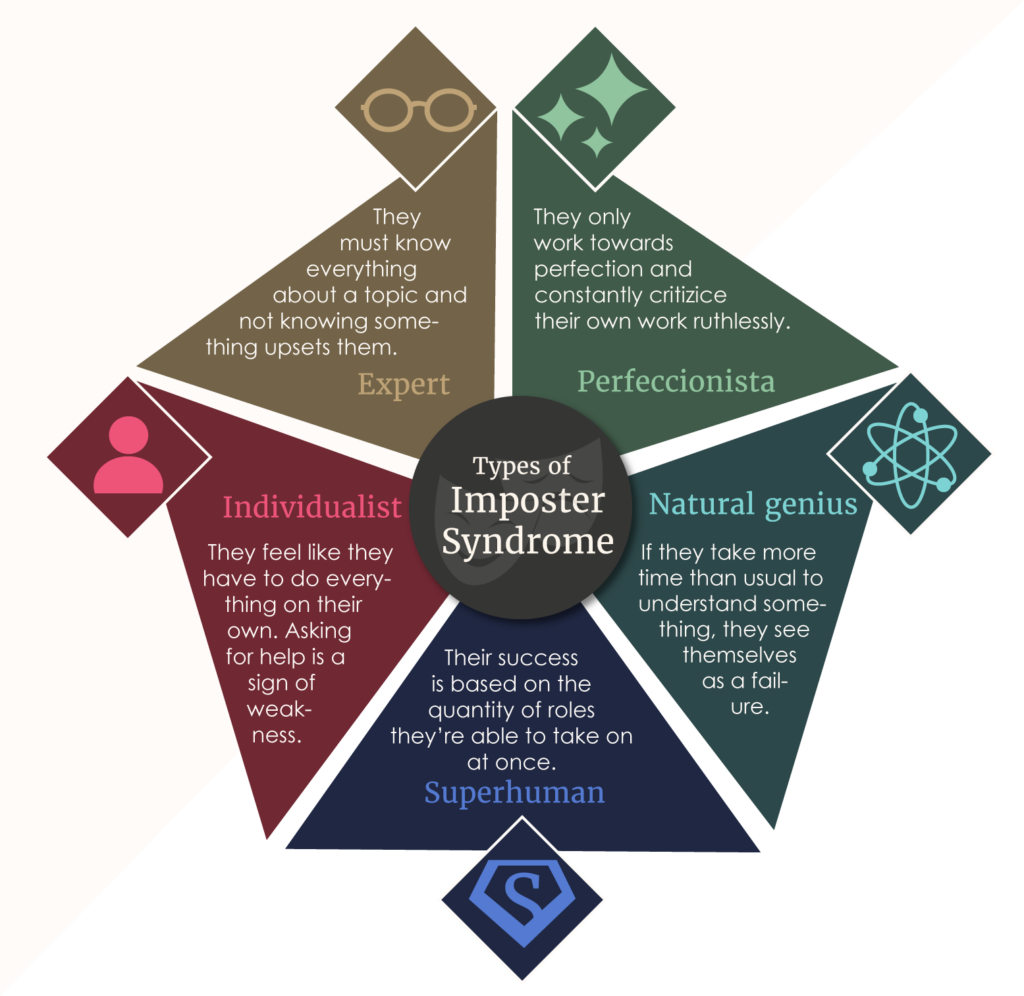At least once in our lives, we all have felt that we are not qualified for something. We underestimate ourselves or are afraid of disappointing our loved ones. However, this becomes a problem when people normalize these feelings in their daily lives, and it reflects in their work and academic environments. This constant feeling has been named impostor syndrome.
Impostor syndrome does not discriminate against gender, socioeconomic status, age, etc. It refers to those “with high motivation who do not recognize their achievements, doubt themselves constantly, and fear exposure as a fraud in their role or position.” Usually, this happens to highly skilled, successful people who perform well and have the following characteristics:
- They think they achieved their position by luck and not on their own merits.
- They work or study excessively to compensate for “what they do not know” or “do not deserve,” sacrificing their well-being and health.
- They distrust and doubt their abilities.
- They isolate themselves for fear of being discovered as a fraud.
- They are dissatisfied with their performance and place high demands on themselves.
- They minimize their achievements.
The syndrome is quite common despite not being considered a clinical psychological disorder. According to a study by Asana, 62% of people worldwide suffer from it at their workplaces. And while impostor syndrome develops due to numerous reasons, anxiety and depression are the most relevant. This condition can further deteriorate a person’s mental health, causing burnout or extreme exhaustion.
The greatest fear that provokes this syndrome is the fear of failure. Normalizing it can be a great challenge for many people who suffer from this disorder. It unleashes negative feelings such as shame, sadness, disappointment, and helplessness, emotions that a person with this syndrome wants to avoid at all costs because they usually want acceptance from others.
Am I an impostor?
To find out if you have impostor syndrome, talk to loved ones about how you feel or examine your own thoughts and attitudes. Notably, this disorder has some variations; experts have identified five different types:

Imagen: Mariana Sofía Jiménez
- The perfectionist: Refers to the person who works hard to achieve perfection, and still, their success does not satisfy them. They usually criticize their work constantly, and it is not an option for them to make a mistake.
- The natural genius: They measure their competency by how quickly they come to understand or do something instead of recognizing their efforts, where their achievements are due to their skills. They want to excel when doing something for the first time and tend to despair and consider it a failure if they do not do it well.
- The superhero: They must take on several roles at once and work hard to prove that they live up to their title. They want to hog all the work, which only makes them feel overwhelmed, leading to burning out.
- The soloist: These people feel they must work alone for fear of showing others their weaknesses. For them, asking for help is a symbol of weakness.
- The expert: They fear being discovered as impostors for lack of knowledge in a given subject. They feel nervous about being appointed specialists, and not knowing something seriously affects their self-esteem. These people usually seek many certifications and studies to ensure their success (despite already having it).
You can take this quiz to evaluate yourself and know your rating on the above scale. Remember that this is an indicator and is not a medical diagnosis.
The impostor in the classroom
Teaching is a sector that does not escape the impostor syndrome; both teachers and students suffer from it. Teachers may become paralyzed by feeling unqualified to take responsibility for their students’ learning or compare themselves to other colleagues. Another frequent example is when a teacher does not know something or is corrected by a student, which can amplify the feelings caused by this disorder when it is enough to admit that this information is unknown to them. However, this can become highly positive because students will appreciate the teacher’s sincerity and feel more confident to share their knowledge.
On the other hand, there is the student community. Teachers will be able to identify the behaviors of their students and plan strategies to mitigate their impact. They can achieve this by promoting dialogue and participation, providing encouraging feedback, and creating inclusive spaces so they do not leave anyone out. However, there may be situations where, depending on the severity of the case, it would be better to encourage the student to seek alternatives to obtain dedicated support.
Fighting the enemy
Our mind is powerful and can be the first obstacle to achieving our goals. It can create thousands of unrealistic negative scenarios and make us believe we are not enough. To counter the impostor syndrome, we must navigate through such thoughts and change our mindset:
- Recognize: Become aware of the disruptive thoughts caused by impostor syndrome. This way, you can identify them, reaffirm that they are not true, and avoid blocking yourself.
- Learn: We can’t know everything. Not knowing something and accepting this with humility is an excellent opportunity to learn something new and develop in a new field.
- Ask for help: Your coworkers, family, and friends will not hesitate to support you in whatever you need. You must not beat yourself up for not knowing something; we can’t be specialists in everything.
- Trust: Recognize that your talents and abilities have made you what you are. These same abilities will help you get ahead when facing any obstacle.
- Don’t compare yourself: It’s never good to compare yourself to others. We all have different skills and paths. Be patient; everything works out over time.
- Enjoy your achievements: We can minimize our achievements so much that we quickly move on to the next task. It is essential to take our time to celebrate and assimilate each achievement. In addition, you can document them in a file on your computer or write them down, big and small. Achievements are still achievements at the end of the day and are on hand when you doubt your abilities.
- Accept failure: The best way to grow is through experience; making mistakes throughout our lives is a constant. We should not see this as something negative but as a stage in the learning cycle and as steps to help us succeed eventually.
- Be good to yourself: We can become very demanding of ourselves. Treating and understanding yourself like a friend or family member is critical.
Compassion and understanding should also apply to oneself, and we cannot do everything or please everyone. It is enough to take care of ourselves, modify our thoughts, and be satisfied with everything we have achieved and the successes to come. There are many goals to meet in the not-too-distant future, and everything comes in due time. Most importantly, your achievements, talents, and experiences have made you who you are. You are not an impostor.
Translation by Daniel Wetta
This article from Observatory of the Institute for the Future of Education may be shared under the terms of the license CC BY-NC-SA 4.0 
)
)


)